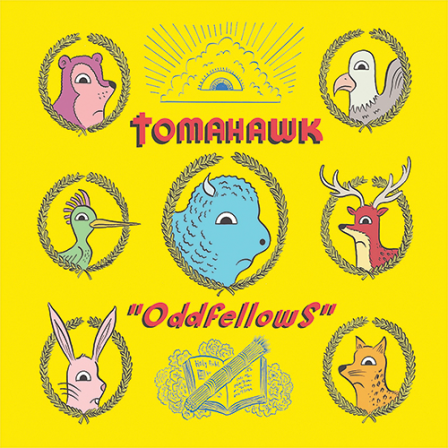Tomahawk is the middle child of Mike Patton’s career. They’re not as extreme nor pummeling as Fantômas; they’re not nearly as weird as Mr. Bungle; and they’re not as “big” as Faith No More and never will be. Yet on paper they’ve got as much firepower as anyone. Near-legend drummer John Stanier, of Helmet (when Helmet were good) and Battles, mans the skins while Duane Denison (speaking of legends), of Jesus Lizard, guards the guitar and Kevin Rutmantis, most famously of The Melvins, brings the bass. It doesn’t get much tighter than that, particularly if you’re a child of the 1990s. Yet Tomahawk get short shrift; you know the Pitchfork grade is going to be “6.5” before you even click into the review.
And I can’t disagree. I’ve always felt ‘Hawk have the supergroup problem; i.e., their advanced skills don’t translate into the songs that would seem to be a sure thing given their natural talents. Oddfellows is another delightful little stab that works really hard to come at the listener from a bevy of angles, and you’ve got to like, short of love, them for that. Patton is in full voice, too. He’s always put a lot of himself into these Tomahawk songs, and despite my aforementioned reservations regarding this quartet overall, I feel he’s becoming more and more of a leader in the group, less afraid of overshadowing his bandmates, which will happen whether he tries or not anyway.
The stronger songs to these brittle ears are the ones that feel like experiments within an album, NOT forced half-singles like “Stone Letter” that were seemingly conjured to offer a sanitized, easily digestible version of what this band is supposed to sound like. “The Quiet Few” is a prime example of what Tomahawk can and can’t do, bolstered by an early Morrissey synth swirl (which also has a Faith No More tinge) and wonderfully barked vocals on the verse. For the chorus, however, there’s this forced feel that hints perhaps they just didn’t know what else to do. Considering the creative juices of these blokes, it’s disappointing, and they seem to know it, as they don’t return to it, opting instead to fade into a refrain of “Walk away-walk away/ WALK AWAY WALK AWAY” that is much more effective.
Other highlights include “A Thousand Eyes” and the title track (mostly by dint of their earworm-y, deceptively simple guitar lines); morose, guilty love letter “I.O.U.;” “Rise Up Dirty Waters,” which will appease those who miss Guapo; and “Baby Let’s Play ____,” a scary afterthought that might contain the secret to the perfect Tomahawk album (then again, I thought the same of “Sir, Yes Sir,” and they don’t even play that one live). Until they find the strength to shun the obligatory, brief shimmers such as the preceding will have to do.
More about: Tomahawk




